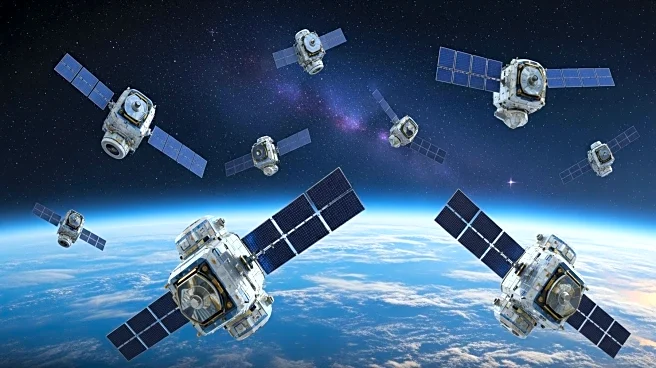What's Happening?
Planet Labs PBC is making significant strides in the satellite imaging sector, leveraging its extensive satellite constellation and strategic partnerships to enhance its Earth observation capabilities. The company has launched next-generation Pelican satellites, which integrate high-resolution optical imaging with synthetic aperture radar (SAR) capabilities. This innovation addresses the limitations of traditional optical systems, particularly in cloud-covered regions. Planet Labs has also secured a €240 million contract with the German government, contributing to a 20% year-over-year revenue increase, reaching $73.4 million in Q2 FY2026. The company's financial performance has improved, with positive adjusted EBITDA and substantial cash reserves, positioning it as a competitive player against rivals like Maxar Technologies and BlackSky.
Why It's Important?
Planet Labs' advancements in satellite imaging are crucial for various sectors, including defense, urban planning, agriculture, and energy. The integration of AI-driven analytics into its platform enhances its geospatial intelligence capabilities, making it a valuable asset for commercial and government sectors. The company's strategic partnerships diversify its revenue streams and reduce reliance on volatile defense budgets. As the satellite imaging market is projected to grow to $15 billion by 2033, Planet Labs' innovative approach and financial resilience make it a compelling investment opportunity. Its ability to balance scale, resolution, and affordability gives it a competitive edge over other industry players.
What's Next?
Planet Labs is likely to continue expanding its market presence through strategic partnerships and technological innovations. The company may focus on high-margin government contracts and AI-driven analytics to improve profitability. Additionally, the expansion of sovereign satellite programs in Asia and the Middle East presents new opportunities for growth, as foreign governments seek to reduce dependence on U.S.-based providers. Investors and stakeholders will be watching closely to see how Planet Labs navigates these opportunities and challenges in the evolving satellite imaging sector.
Beyond the Headlines
The broader implications of Planet Labs' developments include potential shifts in global satellite imaging dynamics, as countries seek to establish their own sovereign satellite capabilities. This could lead to increased competition and collaboration in the industry, influencing international relations and technological advancements. Planet Labs' focus on AI integration and strategic R&D investments may also drive innovation in geospatial intelligence, impacting various industries and public policy decisions.









